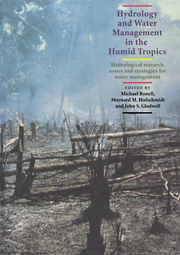 Hydrology and Water Management in the Humid Tropics
Hydrology and Water Management in the Humid Tropics Book contents
- Frontmatter
- Contents
- List of Authors
- Foreword by Federico Mayor, Director-General, UNESCO
- Preface
- Cartographic Credit
- Acknowledgements
- SECTION I INTRODUCTION
- SECTION II HUMID TROPICS SETTING
- 2 Climate and Rainfall Variability in the Humid Tropics
- 3 Operational Hydrology Problems in the Humid Tropics
- 4 The Problems of the Humid Tropics – Opportunities for Reassessment of Hydrological Methodology
- SECTION III REGIONAL HYDROLOGY
- SECTION IV PHYSICAL PROCESSES
- SECTION V PHYSICAL PROCESSES – HUMAN USES: THE INTERFACE
- SECTION VI MANAGEMENT ISSUES
- SECTION VII APPENDICES
- Place index
4 - The Problems of the Humid Tropics – Opportunities for Reassessment of Hydrological Methodology
Published online by Cambridge University Press: 23 December 2009
- Frontmatter
- Contents
- List of Authors
- Foreword by Federico Mayor, Director-General, UNESCO
- Preface
- Cartographic Credit
- Acknowledgements
- SECTION I INTRODUCTION
- SECTION II HUMID TROPICS SETTING
- 2 Climate and Rainfall Variability in the Humid Tropics
- 3 Operational Hydrology Problems in the Humid Tropics
- 4 The Problems of the Humid Tropics – Opportunities for Reassessment of Hydrological Methodology
- SECTION III REGIONAL HYDROLOGY
- SECTION IV PHYSICAL PROCESSES
- SECTION V PHYSICAL PROCESSES – HUMAN USES: THE INTERFACE
- SECTION VI MANAGEMENT ISSUES
- SECTION VII APPENDICES
- Place index
Summary
ABSTRACT
The paper presents the author's personal philosophy of hydrological methodology. It claims that the latter is biased toward mechanistic reductionism and an exaggerated orientation towards short-term technological solutions to water-related problems arising in the temperate climatic zone. It suggests that this bias stands out most clearly against the background of the specific natural conditions of the humid tropics. In this context, three aspects are emphasized as deserving major attention in the development of an adequate scientific basis for the hydrology of the region and for addressing its long-term environmental and water resource problems. These aspects are: 1) non- stationarity of the major geo- and biophysical/chemical processes, 2) a dynamically sound macrohydrology, and 3) quantitative eco-hydrology (i.e. the soil-vegetation-atmosphere interactions as mediated by energy and water).
A HISTORICAL PERSPECTIVE
Hydrology, as most everyone knows, is the science dealing with the dynamics of the hydrological cycle, i.e., with the circulation of water on planet Earth. Not everybody realizes, however, that this dictionary definition is more a statement of a program than a statement of fact. Hydrology has never been practised in a global water context. Such an approach has only recently been contemplated as feasible, and, indeed, as necessary. In spite of this realization, it is by no means clear how such a program can be executed or how much integration is desirable and necessary among the historically-formed autonomous sciences of oceanography, climatology, meteorology and atmospheric physics, glaciology, hydrogeology, and the hydrology of the land surface, i.e., hydrology in the narrow sense.
- Type
- Chapter
- Information
- Hydrology and Water Management in the Humid TropicsHydrological Research Issues and Strategies for Water Management, pp. 45 - 52Publisher: Cambridge University PressPrint publication year: 1993
- 1
- Cited by
